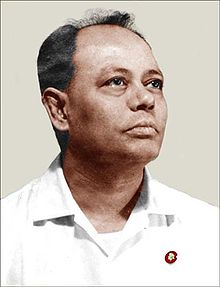Shibdas Ghosh | |
|---|---|
 | |
| General Secretary of the Socialist Unity Centre of India (Communist) | |
| In office 1948-1976 | |
| Succeeded by | Nihar Mukherjee |
| Personal details | |
| Born | 5 August 1923 Dhaka, Bengal Province, British India |
| Died | 5 August 1976 (aged 53) Calcutta, West Bengal, India |
| Political party | Socialist Unity Centre of India (Communist) |
| Residence(s) | Calcutta, West Bengal, India |
| Part of a series on |
| Communism in India |
|---|
 |
|
|
Shibdas Ghosh (5 August 1923 – 5 August 1976) was an Indian communist politician. He was involved in the Communist movement in India for several decades. He was also the founding general secretary of Socialist Unity Centre of India (Communist).[1]
Ghosh was born in the Dhaka District of British India, to a lower-middle-class family. Passing 10th standard from his village school at the age of 13 he joined the Anushilan Samity to participate in the independence movement of India. He was attracted to Manabendranath Roy's ideologies at a very early age. In 1942 he joined the Quit India movement. He was later arrested and incarcerated for three years. There he thoroughly studied Marxism-Leninism. Later along with some colleagues such as Nihar Mukherjee he organised SUCI(C) in 1948. He died on his 53rd birthday in 1976.